News Articles
The latest from the global Clean Cooling community

Rwanda’s MPs visit ACES
26th Feb 2026
On Wednesday, 18 February 2026, a delegation led by honorable Kanyandekwe Christine and honorable Niyorurema Jean René from the Parliamentary Committee on Land, Agriculture, Livestock and Environment visited the Africa Centre of Excellence for Sustainable Cooling and Cold-Chain (ACES).

J&E Hall International Gold Medal won by Judith Evans
24th Feb 2026
At last weeks Institute of Refrigeration (IoR) annual awards in London, Professor Judith Evans received the prestigious J&E Hall International Gold Medal

ACES Inspires the Next Generation of Women in STEM Through Sustainable Cooling
16th Feb 2026
Staff members from ACES participated in the Women Inspiring STEM Excellence (WISE) conference. This event aimed to empower the next generation of female leaders to excel in science, technology, engineering, and mathematics (STEM) fields. Over 500 middle school girls from Kigali attended.

ACES has become officially F-Gas Registered
21st Jan 2026
ACES has become officially F-Gas Registered, receiving the F-Gas Certificate is a major step forward for ACES. It confirms that our systems, equipment and technical practices meet internationally recognised standards.

ACES & RBC sign MoU on vaccine security and cold-chains in Rwanda
19th Jan 2026
The Rwanda Biomedical Centre (RBC) and the Africa Centre of Excellence for Sustainable Cooling and Cold-Chain (ACES) have signed a five-year Memorandum of Understanding to strengthen sustainable vaccine security and critical cold-chain systems in Rwanda.

ACES announces first courses of 2026
15th Jan 2026
ACES has announced its first batch of courses for 2026, offering training in brazing, refrigeration, solar power, and more. Students can choose from six courses, tailored to different sectors and skill levels.

A Milestone Year in Establishing the Community Base for Sustainable Cold-Chain Scale-up
2nd Jan 2026
The first ACES SPOKE programme, in Kenya, has already begun to deliver positive results, with the team this year offering a wide range of training courses, as well as implementing the first application of our novel “Try-Before-You-Buy” (TBYB) scheme.

2025 in Review: Advancing One Health through Sustainable Cold-Chains and Vaccines
31st Dec 2025
In 2025, the CCN's One Health activities focused on the roll-out of training, consolidating our position in the global health community as a key player, and deepening collaboration amongst human health, veterinary, and policymaking practitioners.

Empowerment in action: strengthening communities through training in 2025
30th Dec 2025
In 2025 we have significantly expanded our diverse range of training provision to number over 50 offerings developed by subject matter experts and in collaboration with industry. This approach ensures there is a local network of trained professionals ready to provide support.

2025: A Year of Building the Technology Base at ACES
29th Dec 2025
2025 has been an exciting period for ACES and CCN, on the technologies front, with the accelerated installation of refrigeration equipment enabling us to demonstrate systems, train more people, and provide the services needed to help develop refrigeration markets across Africa.

CCN photographers welcome “special” Panos Pictures collaboration
17th Dec 2025
The CCN media library launched today, providing a curated, open-access library of cold-chain-related images. Developed in collaboration with the London-based picture agency Panos Pictures, it will serve to bring the work of CCN-trained photographers to the attention of major international media outlets.

ACES Wins at the LSBU Research and Innovation Festival
15th Dec 2025
ACES announced as the winner for best Knowledge Exchange or Business Engagement Project of the Year at the recent LSBU Research and Innovation Festival

ACES Mini Cooling Festival "makes STEM come to life" for Rwandan schoolchildren
10th Dec 2025
On Saturday 6 December, 132 students from Ntare Louisenlund School travelled to the ACES campus in Kigali for a "Mini Cooling Festival", a hands-on learning event that set out to "inspire students to understand refrigeration while they are still young".

ACES to welcome school children for a Special STEM visit on December 6th
2nd Dec 2025
The excitement from the 2025 Festival of Cooling is still spreading and this time, it’s bringing an entire class to ACES for a dedicated hands-on learning experience.

Launch of a fast-tracked mini Centre of Excellence in Haryana, India
12th Nov 2025
A mini Centre of Excellence on Sustainable Crop Post-harvest Management and Cold-Chain (CoE-SPMCC) to revolutionise sustainable cooling and cold-chain ecosystems in Haryana, India is being set up.

Try Before You Buy
4th Nov 2025
Derisking Cold-Chain Systems to help farmers validate business models in Kenya The uniqueness and advantage of the Try Before You Buy offer is that the associated technology is only introduced after farmers and cooperative leaders have undergone a structured process of engagement, training, and business planning.

Sustainable Cold-Chain For The Global South 2025
3rd Nov 2025
Investigating how we have set out to holistically understand and cover all bases, from designing food and planning health corridors, future energy strategies, and climate risk mitigations, to pulling value back to farming communities, training engineers and technicians, and understanding overall value.

IOR And ACES Sign MOU to Foster International Collaboration
28th Oct 2025
The Institute of Refrigeration (IOR) and the African Centre for Excellence in Sustainable Cold Chain (ACES) have signed a Memorandum of Understanding (MOU) to strengthen collaboration and promote the exchange of ideas and expertise.

ACES and Clean Cooling Network’s Train the Trainer Programme secured accreditation
27th Oct 2025
The Institution of Agricultural Engineers (IAgrE) has formally accredited the Train the Trainer Programme delivered by the Africa Centre of Excellence for Sustainable Cooling and Cold-Chain (ACES) and the Clean Cooling Network (CCN) at the ACES campus in Kigali.

Visual storytelling for a Cool World – CCN to collaborate with Panos Pictures
22nd Oct 2025
Through the partnership with Panos Pictures, the Clean Cooling Image Database will serve as a dedicated professional asset for sharing images with external clients, stakeholders, and the media.

The #FestivalOfCooling Round Up
13th Oct 2025
For 4 days, we had demonstrations, panel discussions, professional development, mentorship, photography exhibits, market insights, networking and collaboration and more.

Start-Ups Meet Experts in Innovation Clinic
9th Oct 2025
The 3rd day of the Festival of Cooling brought together start-ups, innovators, cooling experts, university students, and staff, among others, to celebrate the intersection of innovation, design, and entrepreneurship in the cooling sector, where ideas become prototypes and evolve into scalable solutions that improve lives and markets.

Students explore cooling innovations at ACES festival
8th Oct 2025
The Africa Centre of Excellence for Sustainable Cooling and Cold-Chain (ACES) and the Clean Cooling Network, hosted a successful Schools and Education Day during the ongoing Festival of Cooling, bringing together students and teachers from eight secondary schools across Rwanda.

The Festival Of Cooling mid-week round up
8th Oct 2025
What better way to show all the great activity at the Festival of Cooling so far than a mid-week photo round-up? From innovative technologies to ice cream and lollies, the Festival keeps getting cooler and cooler!

Strengthening Africa’s Cold-chain Capacity: Lessons and Impact from Four Foundation Course Cohorts
6th Oct 2025
Over 55 early-career professionals, agripreneurs, engineers, and health specialists have now graduated from the four cohorts of the Cold-chain Foundation Course delivered between May 2024 and August 2025.
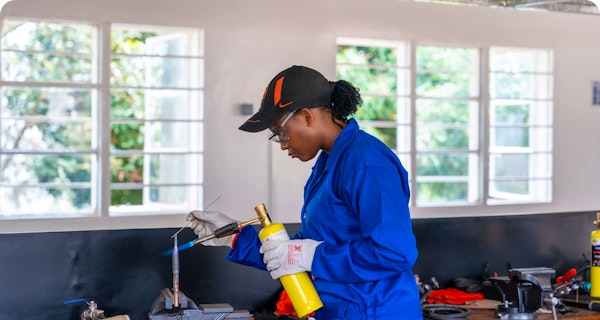
The brazing torch comes back longer and stronger!
30th Sep 2025
Building on the success earlier this year of our first brazing course, which was held at ACES in Kigali, Rwanda, we are pleased to announce that we are now relaunching the training in a redesigned format.

We’re getting activity-ready for the Festival of Cooling
30th Sep 2025
The Festival of Cooling starts next week - taking place at the Rubirizi campus of ACES in Kigali, Rwanda, from October 7th – 10th. From Lego refrigeration kits and quizzes to home fridge tests, there are lots of activities planned.

Harnessing Thermal Energy: Essentials Course on Phase Change Materials (PCMs) for Sustainable Cooling
25th Sep 2025
Apply to the Essentials Course on Phase Change Materials (PCMs) course by October 20th, 2025 and unlock the power of thermal energy with Phase Change Materials — where science meets sustainable cooling!

The ACES demo hall – a new state-of-the-art flexible facility to support clean cooling uptake across Africa
23rd Sep 2025
With a 30 x 20 meter footprint and 6-8 meters of height, the ACES demo hall is a big flexible space where a diverse range of cooling and cold-chain equipment can be installed, tested, developed and showcased.

Getting specification and commissioning right
18th Sep 2025
CCN is launching a new one-day course on cold-chain specification and commissioning, to be delivered at its Africa Centre of Excellence for Sustainable Cooling and Cold-Chain (ACES) in Kigali - dedicated to training sector professionals in cold-chain specification and commissioning.

ACES marks Ozone Day 2025 at Kigali campus: Celebrating 40 Years of Global Action
17th Sep 2025
On 16 September 2025, the African Centre of Excellence for Sustainable Cooling and Cold-Chain (ACES) joined the global community in commemorating the International Day for the Preservation of the Ozone Layer and the 40th Anniversary of the Vienna Convention.
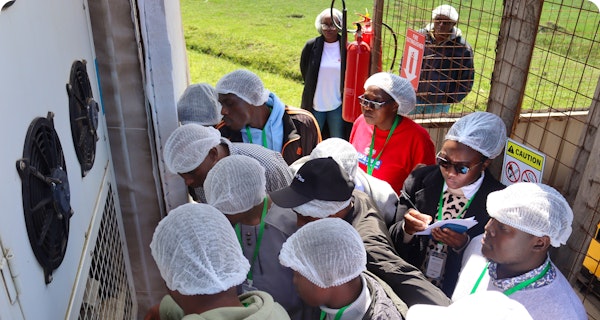
Strengthening cold-chain capacity in Africa: CCN successfully hosts pivotal foundation course
10th Sep 2025
The five-day training brought together 14 participants for an intensive learning experience on cold-chain systems and their applications in the food and pharmaceutical sectors.

Faults on purpose - accelerating experience today for Africa’s cooling engineers of tomorrow
4th Sep 2025
At (ACES) in Rwanda, we are training engineers and technicians on a novel unit that deliberately fails. With 25 built-in designed faults, this teaching rig gives our students the confidence and competence needed to tackle a range of technical challenges that they will likely encounter once in practice beyond the Academy.

The Start-up Pitch Competition: OPEN NOW
2nd Sep 2025
As part of the Festival of Cooling, we invite young companies to participate in our startup pitch competition. We want you to step forward and showcase solutions that could make cooling and cold-chain smarter, cleaner, and more accessible in Rwanda with potential to scale up in the Global South.

Festival of Cooling Competition: OPEN NOW
29th Aug 2025
As part of the Festival of Cooling, the Clean Cooling Network invites you to take part in a photography competition that shines a light on how cooling manifests in our day-to-day life, whether that's through food, health, nature or technology.

COMPETITION ANNOUNCEMENT - Turn your creativity into impact at the Festival of Cooling
22nd Aug 2025
Two official pre-festival competitions will give visual storytellers and innovators a chance to put their perspectives and products in front of an audience that matters: the “Photography Competition” and the “Startup Pitch Competition”.

There’s something for everyone at the Festival of Cooling – Making the invisible visible
20th Aug 2025
From 6th – 10th October 2025, the Festival of Cooling in Kigali, Rwanda, will be the go-to event exploring one of the most powerful yet underrated forces that is silently shaping the future of cooling.
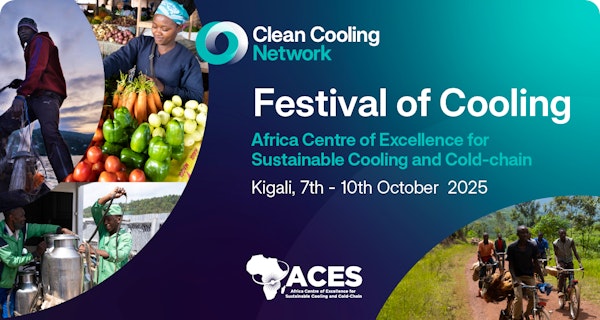
The countdown begins for the Festival of Cooling. Bringing innovation, awareness, and action to the cold-chain
18th Aug 2025
The countdown is on for the Festival of Cooling 2025, a five-day celebration dedicated to showcasing innovation, raising awareness, and driving action for the adoption of cold-chains in the agri-food sector.
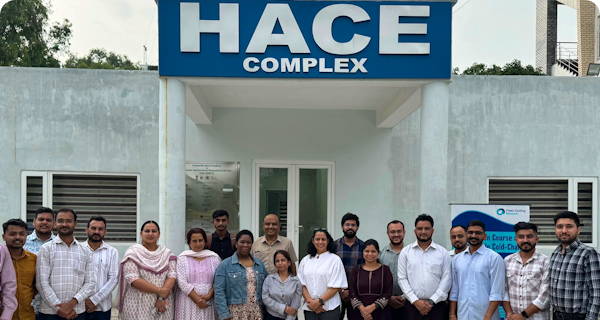
CCN India team to join Cool World conference
18th Aug 2025
Representatives from the CCN team for India will join the international “Cool World: Sustainable Cold-Chain for the Global South” conference in October to discuss the programme’s plans.
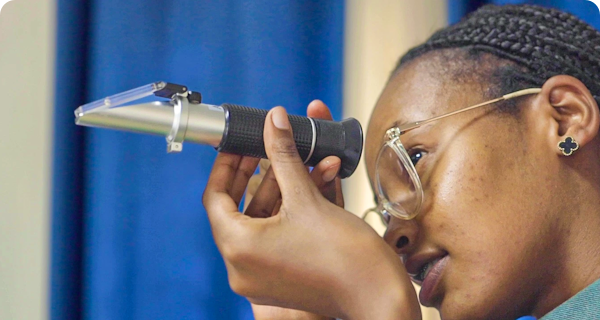
Innovation in postgraduate education
8th Aug 2025
The higher education sector is undergoing rapid changes as the need for access to learning opportunities has never been greater, new skill sets are required to support future challenges, and mechanisms for engaging students are evolving swiftly.

Launch of the First Clean Cooling Academy online course
4th Aug 2025
The new e-learning course, “Essentials in Cold-Chain Systems”, has been jointly developed by experts from CCN/ACES and the University of Birmingham, London South Bank, and Cranfield University.
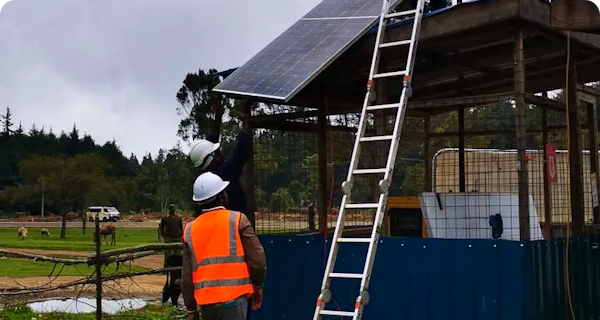
Advancing cold transport solutions: Installation and testing of solar-powered PCM freezer at ACTS
31st Jul 2025
Following a month of technology testing, the Lari farmers will be using PCM cold storage (charged in a solar-powered freezer) and insulated boxes to move temperature sensitive horticulture produce to market. They will be able to test the performance against their traditional vehicle with Carrier TRU as part of the Try Before You Buy (TBYB) programme.
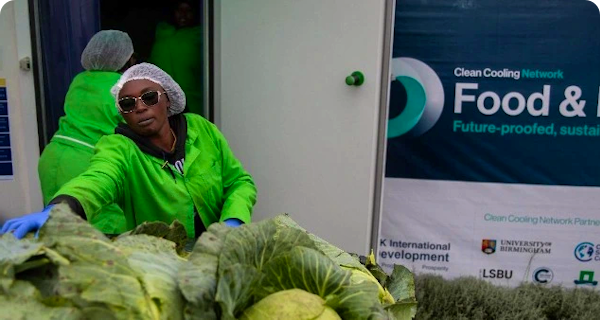
ACES SPOKE programme delivers farmers 50% uplift in return
30th Jul 2025
In March 2025, the African Centre for Technology Studies (ACTS), in collaboration with the Clean Cooling Network, the Lari Horticultural Farmers’ Cooperative Society Limited (LHFCSL), and key stakeholders, launched Kenya’s and Africa’s first “Try Before You Buy” (TBYB) sustainable cooling and cold-chain unit in Kinale, Lari Sub-County, Kiambu County.
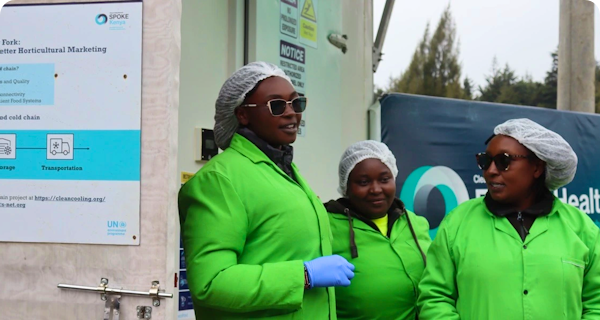
Our community cold-chain development programme is open for applications
29th Jul 2025
Smallholder farmer organisations operating within 200kms of Nairobi, Kenya are invited to submit an Expression of Interest (EOI) to participate in our next community cold-chain engagement programme. As an example of the programme’s success, the Lari cooperative has been able to earn – on average – over 50% higher return for their produce than previously due to their participation in the programme.

Breaking biases and barriers: Diverse professionals unite at the ACES for ‘GESI Sensitisation and Integration Workshop’
25th Jul 2025
A dynamic and diverse group of 16 professionals spanning a range of backgrounds, ages and geographic origins have convened at the ACES campus for a week-long intensive workshop on Gender Equality and Social Inclusion (GESI) - within a cooling and cold-chain context.
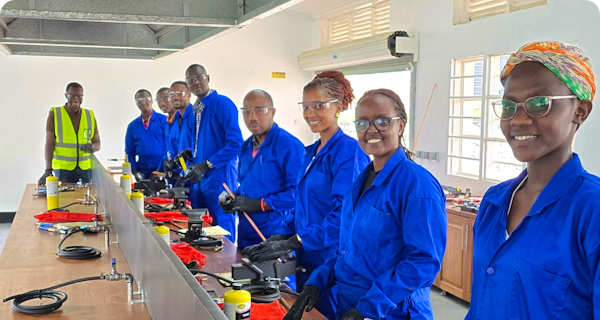
Lighting the torch on brazing
26th Jun 2025
In the race toward sustainable cooling and climate resilience, one seemingly small skill plays an outsized role: brazing. This week marked an important milestone for our refrigeration students, as we hosted our very first one-day Brazing Techniques for Refrigeration Systems course at the ACES, Clean Cooling Academy in Kigali.
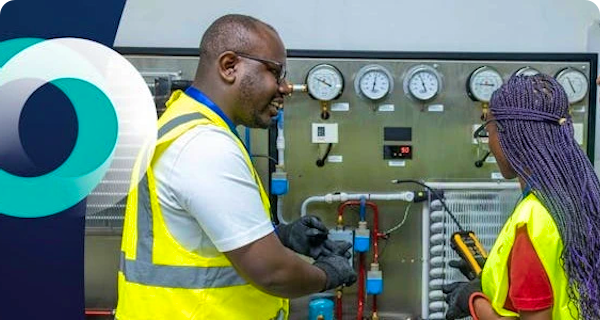
CCN annual review: June 2025
20th Jun 2025
This has been a pivotal year for the Sustainable Cooling and Cold-chain Solutions Programme. Activities have transitioned from the design and development of core facilities, tools, training, and content to ramped-up implementation through delivery of training courses, demonstration, testing, and roll-out of activities through the Clean Cooling Network (CCN), serving as the umbrella brand.

Training for tomorrow: The role of R448A rigs at ACES
16th Jun 2025
As global temperatures rise, so does the demand for sustainable cooling. At the Africa Centre of Excellence for Sustainable Cooling and Cold-chain (ACES), Rubirizi campus in Kigali, R448A training rigs are shaping the next generation of refrigeration professionals.
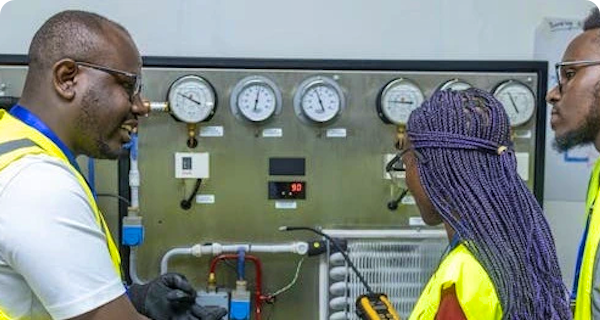
Strengthening cold-chain systems in Africa can reduce food loss locally
11th Jun 2025
University of Birmingham and partners extend sustainable cooling programme in Africa A major programme, led by the University of Birmingham and UNEP United for Efficiency, is extending its work in Africa over the next 12 months to speed the transition to clean cold - reducing food loss and improve vaccine and health supply chains.

Cool innovations, hot ideas, real-world impact... The Festival of Cooling is coming to Kigali!
2nd Jun 2025
Between 7th to 10th October 2025, at the Africa Centre of Excellence for Sustainable Cooling and Cold Chain (ACES), this one-of-a-kind festival will turn a quiet revolution into a loud celebration. Five thrilling days in Kigali!




